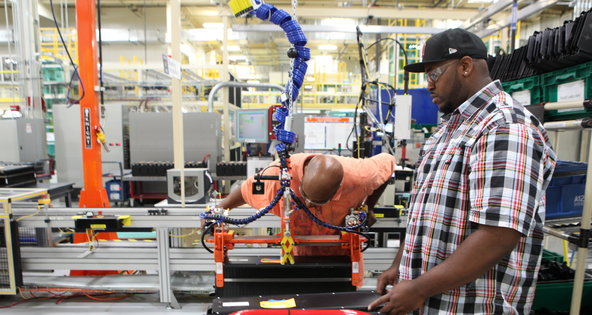 Stephen McGee for The New York TimesWanxiang Group of China has agreed to buy A123 Systems, a bankrupt manufacturer of high-tech batteries.
Stephen McGee for The New York TimesWanxiang Group of China has agreed to buy A123 Systems, a bankrupt manufacturer of high-tech batteries.
HONG KONG — Even as Wall Street deal makers await a revival of the moribund merger market, Chinese companies are shopping abroad with their wallets out.
Yet they are also facing scrutiny, particularly in Washington, as Chinese corporate buying trips coincide with a growing assertiveness in Chinese foreign policy, including the deployment in recent months of surveillance vessels and even naval destroyers and frigates in a series of territorial confrontations with American allies like Japan, Vietnam and the Philippines.
So far this year, the dollar volume of Chinese acquisitions overseas is up 28 percent from the same period a year ago, according to Thomson Reuters data. That compares with a 2.8 percent slump in global merger and acquisition volume over all.
Related Links
Chinese international acquisitions are ahead for the year despite a slump during the third quarter, as state-owned enterprises, which are the main Chinese buyers, and some private enterprises waited for a change in the country’s political leadership at the Communist Party Congress in mid-November. But now the Chinese buyers are back.
Two deals by Chinese companies were announced this week, and bankers and lawyers say that discussions are starting or are already under way on numerous other transactions. Many of those, however, may take as long as a year to complete given China’s bureaucratic approval processes.
 Dave Olecko/Nexen, via European Pressphoto AgencyAn oil drilling site belonging to Nexen, a Canadian company that is the subject of a takeover bid from the Chinese group Cnooc.
Dave Olecko/Nexen, via European Pressphoto AgencyAn oil drilling site belonging to Nexen, a Canadian company that is the subject of a takeover bid from the Chinese group Cnooc.
“You will see an acceleration — you see it now,” although it would not amount to an immediate flood of transactions, said André Loesekrug-Pietri, the chairman and managing partner of A Capital, a Hong Kong-based private equity fund.
Indeed, Beijing is pushing for additional deals, and has encouraged the state-controlled banking sector to finance them.
“An increase in overseas investment by Chinese companies is an inevitable trend,” the commerce minister, Chen Deming, said at a conference two weeks ago, adding that China did not want to remain overwhelmingly invested in fixed-income securities.
“With foreign reserves of $3 trillion in hand,” he added, “we will not sit back and watch the assets depreciate with the third round of quantitative easing. We must inject it into the real economy and make our contribution to global prosperity.”
Wanxiang Group agreed on Sunday to pay $256 million to buy most of A123 Systems, a bankrupt manufacturer of high-tech batteries. And a consortium of Chinese investors agreed on the same day to pay $4.2 billion for a controlling stake in the American International Group’s aircraft leasing business.
On Friday, Canada approved the $15 billion acquisition of Nexen, an energy company, by the China National Offshore Oil Corporation, or Cnooc. That deal is still pending approval by the American committee that reviews foreign investments on national security grounds, commonly known as Cfius.
A few deals may be completed this winter, but the real surge is likely to happen by next summer, bankers and lawyers said. State-owned enterprises account for as much as four-fifths of China’s overseas acquisitions by value and many of their top executives are expected to change jobs this winter as the country’s new leaders start promoting their followers.
While the Communist Party Congress in November produced a new Politburo, a new slate of government ministers and vice premiers must still be selected at the National People’s Congress in March, a process that could also slow down deals.
Chinese regulations further require that at least three different agencies approve each overseas acquisition — the Ministry of Commerce, the National Development and Reform Commission and the State Administration of Exchange Control. The assent of a fourth, the Ministry of Industry and Information Technology, is needed to qualify for extra financing and faster approval in certain sectors deemed strategic, like clean energy, said Mao Tong, a partner at the law firm Squire Sanders.
But despite the long lead time for Chinese deals, bankers say the process is clearly starting.
Two of the biggest deals by Chinese companies this year were for control of North American companies. The bid for the A.I.G. business, the International Lease Finance Corporation, or I.L.F.C., is the biggest takeover by Chinese entities on record, according to data from Thomson Reuters.
The roots of that transaction were planted last fall. Members of China’s new government wanted to show the country’s seriousness in pursuing investments outside of China, and spent time assembling the most fitting consortium to pursue a deal for the business.
The government chose as the face of the deal Weng Xianding, a veteran of China’s financial regulatory agencies who has turned to investing. His company, New China Trust, is essentially a major Chinese commercial lender, counting Western firms like Barclays among its investors.
Once the preferred consortium was formed around September, it began talking with A.I.G., with many of the details being negotiated between Mr. Weng and the American insurer’s chief executive, Robert H. Benmosche. A goal for the Chinese, a person with direct knowledge of the matter said, was to conduct the talks in a “Western way,” using Western advisers and not getting bogged down in traditional bureaucratic mire.
The talks were completed in just over three months, and the buyers successfully negotiated a discount of nearly half of I.L.F.C.’s book value.
Two evolving trends are apparent in Chinese international deal making, Chinese government officials, bankers, lawyers and trade experts said in interviews.
The government is putting heavy pressure on Chinese companies to seek minority stakes, and not to automatically seek full control, so as to tap foreign management expertise, two officials said. At the same time, Chinese companies are broadening their range of acquisition targets to include more industrial manufacturers and consumer brand companies, even as they maintain their interest in natural resources and financial services.
“I wouldn’t say there’s a desire to buy minority stakes, but I think there’s a greater acceptance that’s an appropriate thing to do,” said Michael S. Weiss, the head of China mergers and acquisitions at Morgan Stanley.
Other bankers said that one big obstacle to the purchase of minority stakes lay in the wariness of many foreign companies in accepting a Chinese partner — particularly since nearly four-fifths of Chinese acquirers are state-owned enterprises, and most of the rest tend to have Chinese government links.
Many of today’s buyers have drawn lessons from past failures and moved to assuage government regulators before striking deals. Cnooc, in particular, learned from its failed bid to buy the oil company Unocal seven years ago, and tried to apply those lessons in its pursuit of Nexen.
The Chinese company considered the deal in part because it believed that a takeover could win approval, according to a person with direct knowledge of the matter. While a big player in Canada’s energy community, Nexen was not one of the country’s iconic companies, heading off the sort of brutal fight that surrounded a takeover battle for Potash, the producer of an important fertilizing ingredient.
Cnooc hired an army of advisers, including lobbyists and public relations specialists, to press the point that a deal would only strengthen the Canadian energy company. And Cnooc was open about much of its financing, aiming to halt concerns that it was being financed cheaply by state-run banks.
Still, national security concerns could also slow some deals. Bankers and lawyers say that Cfius, which stands for the Committee on Foreign Investment in the United States, can sometimes prove frustrating to would-be buyers. The group scrutinizes deals to ensure that they do not harm the country’s national security interests.
Unlike the process in Canada, where negotiations with the foreign investment watchdog are public, the Cfius review takes place largely behind closed doors, and buyers are not always told why deals are rejected.
A Treasury spokeswoman, Natalie Earnest, said in a statement: “As we consider foreign investments in the United States, of course, we have an obligation — like any country — to protect our national security, and that is the exclusive focus of Cfius.”
Michael R. Wessel, a Democratic appointee to the United States-China Economic and Security Review Commission, said that bipartisan concern was growing in Congress about the first of the Chinese deals to be announced this autumn, a $117.6 million acquisition of Complete Genomics, a company in Mountain View, Calif., that does DNA sequencing.
Mr. Wessel, who also advises the United Steelworkers union on trade issues, was also critical of the A.I.G. deal. He said that the Chinese government could pressure airlines to buy Chinese-made parts for their leases, and could eventually urge airlines to lease Chinese-made civilian airliners now being developed.
A spokesman for the buyers’ group said in a statement that I.L.F.C. already had one of the largest aircraft order books in aviation, with a commitment to purchase up to 279 Boeing and Airbus aircraft between now and 2020. “We will continue to add to this order book as we see opportunities in the marketplace based on the market appeal of the aircraft and the economics offered by the manufacturers,” he added.
Some would-be Chinese buyers have not fully considered how much work is needed to ensure that their investments will go through, advisers say.
“I think many Chinese companies in particular have not taken into account the need to be in touch with Washington policy makers about their needs,” said Nancy L. McLernon, the chief executive of the Organization for International Investment, a group that represents domestic subsidiaries of foreign companies. “Those who do, fare best.”
Keith Bradsher reported from Hong Kong, and Michael J. de la Merced from New York.
Article source: http://dealbook.nytimes.com/2012/12/11/china-woos-overseas-companies-looking-for-deals/?partner=rss&emc=rss